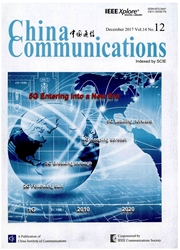

 中文摘要:
中文摘要:
Signal-to-noise ratio(SNR) and channel estimations are critical for 60-GHz communications to track the optimal transmission and reception beam pairs.However,the excessive pilot overhead for the estimations severely reduces system throughput in fast-rotation scenarios.In order to address this problem,we firstly demonstrate the potential sparseness property of 60-GHz channel in beam tracking;subsequently,via exploiting this property,we propose a novel compressed SNR-and-channel estimation.The estimation is conducted in a three-stage fashion,including the unstructured estimation,nonzero-tap detection,and structured estimation with nonzero-tap location.Numerical simulations show that,in the case of substantial reduction of the pilot overhead,the proposed estimator still reveals a significant improvement in terms of estimation performance over the scheme in IEEE 802.11 ad.Furthermore,it is also demonstrated that the proposed SNR and channel estimators can approach the lower bounds in sparse channels so long as SNR exceeds 8 dB.
 英文摘要:
英文摘要:
Signal-to-noise ratio (SNR) and channel estimations are critical for 60-GHz communications to track the optimal trans- mission and reception beam pairs. However, the excessive pilot overhead for the estima- tions severely reduces system throughput in fast-rotation scenarios. In order to address this problem, we firstly demonstrate the potential sparseness property of 60-GHz channel in beam tracking; subsequently, via exploiting this property, we propose a novel compressed SNR-and-channel estimation. The estimation is conducted in a three-stage fashion, includ- ing the unstructured estimation, nonzero-tap detection, and structured estimation with non- zero-tap location. Numerical simulations show that, in the case of substantial reduction of the pilot overhead, the proposed estimator still reveals a significant improvement in terms of estimation performance over the scheme in IEEE 802.1 lad. Furthermore, it is also demon- strated that the proposed SNR and channel estimators can approach the lower bounds in sparse channels so long as SNR exceeds 8 dB.
 同期刊论文项目
同期刊论文项目
 同项目期刊论文
同项目期刊论文
 Iterative Eigenvalue Decomposition andMultipath-Grouping Tx/Rx Joint Beamformings for Millimeter-Wav
Iterative Eigenvalue Decomposition andMultipath-Grouping Tx/Rx Joint Beamformings for Millimeter-Wav Iterative Joint Beamforming Training with Constant-Amplitude Phased Arrays in Millimeter-Wave Commun
Iterative Joint Beamforming Training with Constant-Amplitude Phased Arrays in Millimeter-Wave Commun Normalized-Energy-Detector Serial Search Acquisition Scheme for Packet Communication Systems with No
Normalized-Energy-Detector Serial Search Acquisition Scheme for Packet Communication Systems with No 期刊信息
期刊信息
